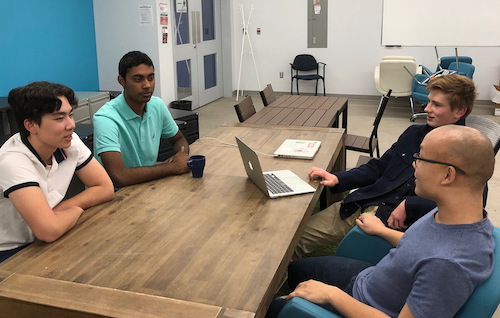The Daily Bulletin is published by Internal and Leadership Communications, part of University Communications
Contact us at bulletin@uwaterloo.ca
Submission guidelines
Editor:
Brandon Sweet
University Communications
bulletin@uwaterloo.ca

By Heather Bean. This article from Waterloo News is published in recognition of Earth Day 2021.
When a flood hits a Canadian community and rising waters wash out roads, governments at all levels respond with heroic evacuations of vulnerable residents and emergency food and shelter.
But what are the hidden costs to communities when flood waters recede, and why are some left devastated while others rebound?
 “We know how much it costs to rebuild a washed-out road. What we don’t consider is the cost of people getting knocked out of the workforce, suffering mental health problems as a result of the shock, and the ripple effect throughout the community. And we know from research that those costs tend to be much higher,” says Jason Thistlethwaite, a professor in the School of Environment, Enterprise and Development and an expert on flood risk.
“We know how much it costs to rebuild a washed-out road. What we don’t consider is the cost of people getting knocked out of the workforce, suffering mental health problems as a result of the shock, and the ripple effect throughout the community. And we know from research that those costs tend to be much higher,” says Jason Thistlethwaite, a professor in the School of Environment, Enterprise and Development and an expert on flood risk.
“The bigger numbers hidden in there are the long-term costs, the social costs, which don’t get captured in the initial disaster appraisal,” he says.
Thistlethwaite wants to help governments make better, long-term plans with better data. He co-leads the Climate Risk Research Group (CRRG) which is developing a tool that pinpoints the areas in Canada where flooding risk overlaps with socioeconomic vulnerability.
To build it, they’ve established the country’s only data-sharing partnership with global flood risk management company JBA Risk Management. That gives CRRG access to Canada’s first comprehensive flood risk model. But a map of flood risk can’t give the full picture. To identify where flooding would be most devastating over the longer term, Thistlethwaite says they have developed what they believe to be the most comprehensive socioeconomic vulnerability index in Canada.”
It was no small feat. Working with grants from the Social Sciences and Humanities Research Council (SSHRCC) and the Marine Environmental Observation Prediction and Response Network (MEOPAR), Thistlethwaite and Ph.D. student Liton Chakraborty spent three years developing and creating visualizations of the index. The team looked at existing best practices for building socioeconomic vulnerability indexes and studied examples from around the world to determine which indicators to include. “We wanted ours to be better,” he explains. The resulting index includes 49 indicators of vulnerability, such as low income, multiple family members, and access to community and emergency services.”
Getting the data from Statistics Canada was a long process. “You have to go through a rigorous process to use that kind of sensitive information.” Then came the testing stage: “Our PhD wanted to make sure we validated our assumptions through econometric and statistical analysis to make sure the results we were coming up with weren’t random.” Finally, the team overlaid their data with JBA’s map of flood risk to reveal Canada’s areas of greatest vulnerability to floods.
The next steps involve getting their information into the right hands. Their research already has strong support from Public Safety Canada and Natural Resources Canada: “We’re making sure that whatever we know, they know as well,” Thistlethwaite says.
Andrea Minano, a PhD Candidate and manager of the Climate Risk Resource Group, is working to develop tools that visualize the teams research, including the use of geographic information systems to help local governments make decisions about where to safely develop land, where to mitigate effects, and when it’s time to start thinking about managed retreat: relocating a community that can’t be protected from cycles of repeated flooding. Thistlethwaite wants to connect with the Canada Mortgage and Housing Commission, as well as municipalities across the country.
Most of all, though, he wants everyday citizens to have access to their flood risk information. “We want to empower Canadians to go down to city council and question the logic of putting a development in a high-risk area, when we have data that in the event of a disaster, the community will be socializing that risk, with no liability for either the municipality or the developer.”
“These are not Acts of God; these are acts of poor governance, and their effects are predictable. The fact that they continue to happen reveals that governments are ignoring science, and it’s time we held them to account for these failings.”

This article originally featured on the St. Paul's University College website is published in recognition of Earth Day 2021.
Given the growing impact of climate change, building environmentally sustainable products and services has become more important than ever before. So, it comes as no surprise that GreenHouse (GH) students continue to build ventures with a sustainability focus. Whether it’s a product or service to help you consume more sustainably, or an idea to support existing businesses transition into a more sustainable business model.
We took the time to catch up with two of the winners from the most recent Social Impact Showcase who focused their ventures on sustainability for social impact.
Fourth-year Environment, Resources and Sustainability (ERS) student Ashoke Mohanraj was experiencing the pains of clunky supplement packaging every time he bought a new product to support his health and fitness goals. From protein powders to nutritional supplements he purchased, he noticed the packaging was unappealing, took up a lot of space and every time he bought new supplements, it was generating unnecessary plastic waste.
With this problem in mind, he came to GH’s Social Innovators in Training program looking for support with resources and direction for his idea, Sup Zero. The venture aims to provide consultancy to small or medium-sized supplement companies looking to create more responsible and sustainable packing solutions for their customers. Noticing consumer trends, Mohanraj liked the idea of replacing the clunky and wasteful plastic supplement containers with a more elegant solution such as a glass jar and utilizing biodegradable packaging for supplement refills.
He felt uniquely positioned to solve this problem using consultancy since he could leverage the technical expertise gained from his ERS degree and experience in the health and fitness space as a powerlifter.
“I never would have considered myself to be an entrepreneur,” says Mohanraj. “But I have really enjoyed becoming part of the GreenHouse community, it has been a great resource for helping me build out my idea and make good connections.”
Sup Zero has recently been awarded $2,000 in funding from the Social Impact Fund to support the design of the sustainable packaging and to pilot the system with local partners this summer.
Started by two first-year Engineering students, Ayush Bhargava and Raymond Wu in their final year of high school, this impressive mobile application promises to take the fashion industry by storm. In a world of detrimental fast fashion consumption, ChangeRoom is the first apparel application of its kind to partner with sustainable clothing brands to bring a seamless shopping experience to life for a growing number of eco-conscious customers. It has even partnered with tech experts at Shopify to bring its vision to life.
Sustainable fashion isn’t the most accessible due to its price-point or visibility to younger, money-conscious consumers, but ChangeRoom is looking to partner with unconventional sustainable apparel companies such as thrift stores to enhance access.
After winning a $5,000 pitch competition with Concept, ChangeRoom sought out the team at GH for more guidance and support with its venture.
“GreenHouse has been so helpful in bringing our goals to life,” says Bhargava. “Being a part of the community has given us new ways to adjust our product for maximum social impact.”
Most recently, ChangeRoom has won the top prize from the Social Impact Fund, $2,500. The team plans to use the funding to increase its monthly active user base and expand its brand partnerships while working full-time on its venture during the summer.
GH understands how impactful these ventures will become for current and future consumers and looks forward to continuously supporting Sup Zero and ChangeRoom through bi-weekly mentorship.

Shift-work and irregular work schedules can cause several health-related issues and affect our defence against infection, according to new research from the University of Waterloo.
These health-related issues occur because the body’s natural clock, called the circadian clock, can be disrupted by inconsistent changes in the sleep-wake schedule and feeding patterns often caused by shift work. To study this, researchers at Waterloo developed a mathematical model to look at how a disruption in the circadian clock affects the immune system in fighting off illness.
“Because our immune system is affected by the circadian clock, our ability to mount an immune response changes during the day,” said Anita Layton, professor of Applied Mathematics, Computer Science, Pharmacy and Biology at Waterloo. “How likely are you to fight off an infection that occurs in the morning than midday? The answer depends on whether you are a man or a woman, and whether you are among quarter of the modern-day labour force that has an irregular work schedule.”
The researchers created new computational models, separately for men and women, which simulate the interplay between the circadian clock and the immune system. The model is composed of the core clock genes, their related proteins, and the regulatory mechanism of pro- and anti-inflammatory mediators. By adjusting the clock, the models can simulate male and female shift-workers.
The results of these computer simulations conclude that the immune response varies with the time of infection. Model simulation suggests that the time before we go to bed is the “worst” time to get an infection. That is the period of the day when our body is least prepared to produce the pro- and anti-inflammatory mediators needed during an infection. Just as importantly, an individual’s sex impacts the severity of the infection.
“Shift-work likely affects men and women differently,” said Stéphanie Abo, a PhD candidate in Waterloo’s Department of Applied Mathematics. “Compared to females, the immune system in males is more prone to overactivation, which can increase their chances of sepsis following an ill-timed infection.”
The study, Modeling the circadian regulation of the immune system: sexually dimorphic effects of shift work, authored by Waterloo’s Faculty of Mathematics’ Layton and Abo, was recently published in the journal PLoS Computational Biology.
 The Writing and Communication Centre (WCC) is hosting focus groups April 27 and 29 to hear about your experiences with inequity and equity at the WCC and with writing/speaking activities.
The Writing and Communication Centre (WCC) is hosting focus groups April 27 and 29 to hear about your experiences with inequity and equity at the WCC and with writing/speaking activities.
"As a thank you for participating, we'll treat you with a $5 Tim Horton's card," says a note from the WCC.
Sign up before April 27 at https://bit.ly/3dg6jw6.
The next Information Systems and Technology IT seminar, Optimizing Your Home Office Ergonomics, will be held Friday, April 23 from 9:00 a.m. to 9:45 a.m. Andrew Scheifele of the Safety Office will be facilitating the seminar. Andrew started work with the University in 2014, and brings with him over 20 years of experience helping individuals with office ergonomics and has met with well over 600 University employees. Managing the ergonomics program and conducting ergonomic assessments are one of the many responsibilities he holds in the Safety Office. In addition, he oversees accident and near miss investigations, WSIB reporting, helping injured employees return to work and supporting legislative compliance.
Students can visit the Student Success Office online for supports including academic development, international student resources, leadership development, exchange and study abroad, and opportunities to get involved.
Instructors can visit the Keep Learning website to get support on adapting their teaching and learning plans for an online environment.
Course templates are available within your course in LEARN to help you build and edit your content and assignment pages quickly.
The following workshops, webinars, and events are offered by the KL team (CTE, CEL, ITMS, LIB):
Employees can access resources to help them work remotely, including managing University records and privacy of personal information. Here are some tips for staying healthy while working from home.
Stay informed about COVID cases on campus by consulting the COVID case tracker.
Whether you’re a student or faculty member, the Writing and Communication Centre has virtual services and programs to help you with all of your academic writing needs. This term we have added evening and weekend one-to-one appointments with our peer tutors, and our NEW one-to-one workshops, where you can learn the content directly from one of our writing advisors.
Co-op students can get help finding a job and find supports to successfully work remotely, develop new skills, access wellness and career information, and contact a co-op or career advisor.
The Centre for Career Action assists undergraduates, graduate students, postdocs, staff, faculty, and alumni through navigating career services that are right for them. You can attend a one-on-one appointment or same day drop-in session at the CCA for assistance with cover letter writing, career planning and much more. You can also book an appointment online or visit our Live Chat to connect with our Client Support Team. The CCA is here to help you.
If you feel overwhelmed or anxious and need to talk to somebody, please contact the University’s Campus Wellness services, either Health Services or Counselling Services. You can also contact the University's Centre for Mental Health Research and Treatment. Good2Talk is a post-secondary student helpline available to all students.
The Library has published a resource guide on how to avoid information overload.
The Faculty Association of the University of Waterloo (FAUW) continues to advocate for its members. Check out the FAUW blog for more information.
The University of Waterloo Staff Association (UWSA) continues to advocate for its members. Check out the UWSA blog for more information.
The Indigenous Initiatives Office is a central hub that provides guidance, support, and resources to all Indigenous and non-Indigenous campus community members and oversees the university Indigenization strategy.
The Waterloo Indigenous Student Centre, based at St. Paul’s University College, provides support and resources for Indigenous students, and educational outreach programs for the broader community, including lectures, and events.
WUSA supports for students:
Peer support (Visit https://wusa.ca/peersupport to book an appointment):
Bike Centre – Will be reopening soon.
Campus Response Team, ICSN, Off Campus Community and Co-op Connection all available online. Check https://wusa.ca for more details.
Food Support Service food hampers are currently available from the Turnkey Desk on weekdays from 7:30 a.m. to 7:00 p.m. in the Student Life Centre. If you have any questions please email us at foodsupport@wusa.ca.
Centre for Academic Policy Support - CAPS is here to assist Waterloo undergraduates throughout their experience in navigating academic policy in the instances of filing petitions, grievances and appeals. Please contact them at caps@wusa.ca. More information is available.
WUSA Commissioners who can help in a variety of areas that students may be experiencing during this time:
WUSA Student Legal Protection Program - Seeking legal counsel can be intimidating, especially if it’s your first time facing a legal issue. The legal assistance helpline provides quick access to legal advice in any area of law, including criminal. Just call 1-833-202-4571.
Empower Me is a confidential mental health and wellness service that connects students with qualified counsellors 24/7. They can be reached at 1-833-628-5589.
Healthy Warriors at Home (Online Fitness)
Drop-in to Warrior Virtual Study Halls on Wednesdays from 5:30 p.m. to 7:00 p.m. Come together in this virtual space to set goals and work independently or in groups each week.
Livestream Exercises for Waterloo staff: Join us for an energy boosting Bootcamp or a fast and effective Express Home Workout. Open to UW Staff and subsidized by the Staff Excellence Fund.
Renison English Language Institute continues to offer virtual events and workshops to help students practice their English language skills.
Warriors vs. Laurier Blood Donation Battle. Join your fellow Warriors, donate blood and help us win the Blood Battle against Laurier for a second year in a row. Set up a profile or add the PFL code: UNIV960995 to your account if you have a blood.ca account already. Questions? Contact WarriorsInfo@uwaterloo.ca.
Retirement of Steve Furino, Thursday, April 22, 3:30 p.m., Microsoft Teams.
A Year of COVID-19: Disparities, Inequities, and Inequalities, the first in a three-part series, Friday, April 23, 1:00 p.m. to 3:00 p.m. Please register to receive a link to this online event.
Waterloo Philosophy Sharma Lecture: "Deepfakes, Deep Harms" presented by Regina Rini, Canada Research Chair in Philosophy of Moral and Social Cognition at York University, Friday, April 23 from 3:30 p.m. to 5:00 p.m. via WebEx.
Lectures in Catholic Experience presents Progressive or Conservative? Archbishop Pocock and the Renewal of the Church in Canada featuring Peter Meehan, St. Jerome's University's President and Vice Chancellor, April 23, 7:30 p.m. online.
Women in Computer Science, Responding to Everyday Bias: How to Recognize it and Interrupt it, Monday, April 26, 12 noon. All are welcome to attend, but registration is required.
Bibliometrics and Research Impact Community Conference, Tuesday, April 27 to Thursday, April 29, 11:00 a.m. to 4:30 p.m. Register for this online event.
The Daily Bulletin is published by Internal and Leadership Communications, part of University Communications
Contact us at bulletin@uwaterloo.ca
Submission guidelines
The University of Waterloo acknowledges that much of our work takes place on the traditional territory of the Neutral, Anishinaabeg, and Haudenosaunee peoples. Our main campus is situated on the Haldimand Tract, the land granted to the Six Nations that includes six miles on each side of the Grand River. Our active work toward reconciliation takes place across our campuses through research, learning, teaching, and community building, and is co-ordinated within the Office of Indigenous Relations.